
NBA treaty allowing players to smoke weed comes into effect
The National Basketball Association has removed cannabis from its banned substances list under a new deal that allows players in the league to smoke weed and invest in cannabis companies. The new collective bargaining agreement, ratified by the NBA and National Basketball Players Association (NBPA) in April, went into effect Saturday, July 1, and will last through the 2029-2030 season.
On Friday, the league and players’ union announced that the final long version of the new Collective Bargaining Agreement (CBA) had been finalized and signed. The terms of the new CBA were previously contained in a shorter memorandum of agreement.
Cannabis removed from the NBA’s list of banned substances
Under the new contract, cannabis will be removed from the NBA’s list of banned substances. The agreement also ends marijuana screenings for players, giving them the freedom to smoke marijuana and use other cannabis products without fear of reprisals.
Although players are allowed to consume cannabis and will no longer be tested for weed, the new contract has some limitations. Athletes are not allowed to be high at games, practice sessions or other team events, and problem cannabis use remains subject to league policies.
“A team that has reason to believe that one of its players is under the influence of marijuana or alcohol during NBA or team-related activities, or has a marijuana- or alcohol-related addiction problem, may refer the player to a required evaluation treatment program. “, it says in a summary of the contract.
The agreement also states that “the NBA and teams may impose appropriate disciplinary action on players who are under the influence while engaged in a team activity or in violation of the law.”
The CBA also allows players to invest in the cannabis industry. Players are allowed to invest in CBD companies and can “hold a passive, non-controlling interest in a company that manufactures products containing marijuana.” Additionally, the summary of the working agreement states that while players are “allowed to advertise a company that manufactures products containing CBD,” they are “still prohibited from advertising marijuana companies.”
Jesse Burns, chief marketing officer at PR firm Grasslands, told SFGATE that the new rules could make NBA athletes the face of the CBD movement, adding that the introduction would give players the opportunity to “feel that moment of health and to really benefit from well-being”. their own CBD brands.
“There is general knowledge that CBD is a pain and inflammation relief drug,” Burns said. “The general public is starting to understand that.”
Previous policy disciplined players for using pot
The previous NBA policy on cannabis included a ban on the use of the drug by all players. Violations of the policy were addressed by enrolling players in the league’s counseling and treatment program at the first violation. Subsequent violations resulted in a $25,000 fine for the second violation and a five-game suspension without pay for the third.
In response to the outbreak of the COVID-19 pandemic, the NBA has suspended player testing for cannabis. In late 2020, League Commissioner Adam Silver said the moratorium was likely to become permanent. He added that instead of a mandatory testing program for all players, the league would approach players who appear to be problematic or addictive cannabis users and decline to penalize players who “occasionally use marijuana.”
“We decided that with all the things that were happening in society, with the pressure and stress that the players were under, we didn’t have to act like Big Brother now,” Silver told NBC. “I think society’s views on marijuana have changed to some extent.”
Cannabis and professional sports
The end of the NBA’s cannabis ban on players follows similar action by top US professional sports leagues. In 2019, Major League Baseball (MLB) removed marijuana from its list of prohibited substances, although the current policy allows players to be disciplined if they appear to be under the influence of cannabis during games, practice, or team meetings.
MLB’s cannabis policy evolved last year when the league announced that teams would be allowed to enter into sponsorship deals with cannabis companies. Four months later, the league announced that products from Colorado-based Charlotte’s Web Holdings had been named “MLB’s official CBD.”
The National Hockey League (NHL) also no longer lists cannabis as a prohibited substance, and players who test positive for the drug will not face disciplinary action. Players found to have “abnormally” high THC levels when tested are referred to a voluntary treatment program.
The National Football League collective bargaining agreement for the 2020–21 season relaxed the league’s cannabis policy, allowing players to use marijuana off-season while maintaining the ban throughout the playing season. The agreement also increased the level of THC that could be present in a player’s drug test before the league launched sanctions, and ended match suspensions for any positive drug tests, allowing players to face fines instead.

Post a comment: